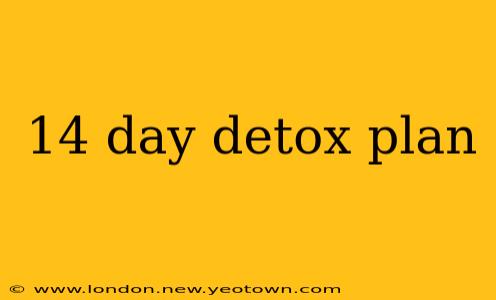Are you feeling sluggish, bloated, or just plain tired? Do you crave a fresh start, a way to reset your body and feel your best? A 14-day detox plan can be a fantastic way to kickstart a healthier lifestyle, but it's crucial to approach it with knowledge and a realistic mindset. This isn't about drastic measures; it's about nourishing your body and gently supporting its natural cleansing processes. Think of it as a refreshing spring cleaning for your insides!
This journey will focus on providing you with a holistic approach, addressing not just what you eat, but also incorporating lifestyle changes that amplify the detox's effectiveness. We'll explore the "why" behind the choices, ensuring you understand the benefits and feel empowered throughout the process.
What is a Detox Plan, Anyway?
Before we dive into the specifics of a 14-day plan, let's clarify what a detox actually entails. Contrary to some popular beliefs, it's not about aggressively ridding your body of everything. Your liver and kidneys already work tirelessly to filter toxins. A detox plan, instead, aims to support these organs, minimizing the burden and optimizing their function. We achieve this through a combination of dietary changes, increased hydration, and lifestyle adjustments.
What Foods to Eat During a 14-Day Detox
The cornerstone of any successful detox is nutrition. Our 14-day plan emphasizes whole, unprocessed foods packed with nutrients. Think vibrant fruits and vegetables, lean proteins, and healthy fats. We'll steer clear of processed foods, refined sugars, and excessive caffeine and alcohol.
Day 1-7: Focusing on Fiber and Hydration
The first week is about gently cleansing your system. We'll emphasize high-fiber foods like fruits (berries, apples, bananas), vegetables (broccoli, spinach, kale), and whole grains (brown rice, quinoa). These foods promote regularity and help eliminate waste products. Crucially, we'll prioritize hydration with plenty of water, herbal teas, and possibly diluted fruit juices.
Day 8-14: Boosting Metabolism and Energy
The second week builds on the foundation of the first. We’ll continue focusing on nutritious foods but introduce foods that support metabolism and energy levels. Think lean proteins (fish, chicken, lentils), healthy fats (avocado, nuts, seeds), and nutrient-dense vegetables. We'll also focus on mindful eating, paying attention to our hunger and fullness cues.
What to Avoid During a 14-Day Detox
This isn't about deprivation, but making mindful choices. Here's what we'll minimize or eliminate:
- Processed Foods: Packaged snacks, fast food, and anything with a long ingredient list.
- Refined Sugars: Soda, candy, pastries, and excessive amounts of sugar in coffee or tea.
- Excessive Caffeine: Limit coffee and black tea.
- Alcohol: Alcohol puts extra stress on your liver, hindering its detoxification abilities.
- Red Meat: Opt for leaner protein sources like fish, chicken, and plant-based alternatives.
How Much Water Should I Drink During a Detox?
How much water should I drink during a 14-day detox?
Aim for at least eight glasses of water daily. Your water intake might need to be higher depending on your activity level and climate. Listen to your body! If you feel thirsty, drink more water.
What are the Benefits of a 14-Day Detox?
What are the benefits of a 14-day detox?
A well-planned detox can lead to improved energy levels, better digestion, clearer skin, and a reduced sense of bloating. It’s also a great opportunity to develop healthier eating habits that benefit you long-term. Remember, consistency is key, and these benefits are enhanced when paired with regular exercise and stress management techniques.
Is a 14-Day Detox Right for Me?
Is a 14-day detox right for me?
While generally safe for healthy individuals, consult your doctor before starting any detox, especially if you have underlying health conditions or are taking medications. This is especially important for individuals with kidney or liver problems. A detox plan should complement, not replace, medical advice.
What are Some Common Detox Side Effects?
What are some common detox side effects?
Some people may experience headaches, fatigue, or mild digestive discomfort in the initial stages. These are often temporary and usually subside as your body adjusts. If you experience severe or persistent symptoms, consult your doctor.
Can I Exercise During a 14-Day Detox?
Gentle exercise like walking, yoga, or light stretching is encouraged. These activities support lymphatic drainage and improve overall well-being. Avoid intense workouts, especially during the first few days, as your body adjusts.
This 14-day detox plan is a guide. Adjust it to your personal needs and preferences, always prioritizing listening to your body. Remember, a healthy lifestyle is a journey, not a race. Enjoy the process and celebrate your progress along the way!

